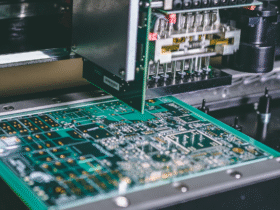Artificial Intelligence (AI) is reshaping industries worldwide, and logistics and supply chain management are no exception. AI-driven technologies enhance efficiency, reduce costs, and streamline operations, making businesses more competitive. As global supply chains grow more complex, AI provides innovative solutions that improve decision-making and operational precision. With its ability to process vast amounts of data and automate repetitive tasks, AI is transforming logistics into a more intelligent and resilient industry.
AI in Logistics: Enhancing Efficiency and Accuracy
Logistics operations involve numerous processes, from inventory management to transportation and last-mile delivery. AI optimizes these aspects by analyzing vast amounts of data in real time. Top AI algorithms help predict demand fluctuations, allowing companies to manage inventory efficiently and reduce stockouts or overstock situations.
1. Predictive Analytics for Demand Forecasting
Traditional forecasting methods rely on historical data, which often leads to inaccuracies. AI-driven predictive analytics leverage real-time market data, customer behavior patterns, and external factors like weather or economic shifts. This helps businesses anticipate demand more accurately, reducing wastage and improving resource allocation.
For instance, retailers use AI to forecast seasonal spikes and plan inventory levels accordingly. AI-driven forecasting minimizes financial losses caused by unsold stock or excessive markdowns. Logistics firms also use AI to predict transit times and delays, helping them optimize shipping schedules.
2. Route Optimization and Fleet Management
AI-powered logistics platforms analyze traffic patterns, weather conditions, and delivery schedules to optimize routes. This reduces fuel consumption, lowers costs, and improves delivery timelines. Companies like Amazon and UPS use AI to streamline fleet management, ensuring on-time deliveries and efficient route planning.
Self-learning AI models continuously refine routing strategies based on real-time data. These models factor in variables such as fuel costs, toll charges, and road closures, leading to cost-efficient and environmentally friendly logistics operations. AI also plays a role in autonomous delivery vehicles, which could soon revolutionize last-mile delivery.
3. Warehouse Automation
AI-driven robotics and automation revolutionize warehouse management. Automated guided vehicles (AGVs) and robotic arms handle sorting, packing, and inventory management with unmatched speed and accuracy. This reduces labor costs and minimizes errors, increasing overall productivity.
AI-powered warehouse management systems (WMS) dynamically allocate storage space, optimizing warehouse layout for maximum efficiency. Smart shelves and AI-driven conveyor systems speed up order fulfillment, enabling companies to meet increasing e-commerce demands without expanding physical storage spaces.
AI in Supply Chain Management: Smarter Decision-Making
Supply chain management involves coordinating multiple suppliers, manufacturers, and distributors. AI enhances transparency and efficiency by providing real-time insights into supply chain performance.
1. Intelligent Supplier Selection and Risk Management
AI-powered supplier management tools evaluate supplier performance based on historical data, pricing trends, and reliability. Companies can make informed decisions by identifying the best suppliers and mitigating risks like delays or quality issues.
AI models assess geopolitical risks, economic fluctuations, and compliance regulations to anticipate potential disruptions. This predictive capability enables businesses to diversify their supplier base and create contingency plans, ensuring supply chain resilience.
2. Automated Quality Control
Computer vision and AI-powered sensors detect defects in manufacturing and packaging processes. This ensures higher quality standards and reduces the chances of defective products reaching consumers.
AI-driven quality control systems analyze images, detect inconsistencies, and identify substandard products before they leave production facilities. This level of precision not only improves product quality but also reduces recalls and warranty claims, saving businesses millions in potential losses.
3. Real-time Inventory Tracking
AI integrates with IoT devices to provide real-time inventory visibility. Smart sensors track product movement, reducing losses due to theft or misplacement. This enhances inventory accuracy and reduces holding costs.
Retailers, manufacturers, and logistics providers use AI-driven demand sensing to adjust production schedules and reorder stock dynamically. Automated replenishment systems ensure that warehouses maintain optimal stock levels, preventing disruptions caused by inventory shortages.
AI-Driven Customer Experience in Logistics and Supply Chain
Customer expectations have risen, demanding faster deliveries, real-time tracking, and personalized experiences. AI enhances customer experience through chatbots, predictive delivery updates, and proactive issue resolution.
1. AI Chatbots for Customer Support
AI-driven chatbots provide instant responses to customer queries, improving service efficiency. They handle order tracking, shipment status updates, and common inquiries, reducing the need for human intervention.
Chatbots powered by natural language processing (NLP) continuously improve their conversational capabilities. They learn from past interactions to provide more accurate and relevant responses, enhancing customer satisfaction.
2. Personalized Delivery Solutions
AI analyzes customer preferences and suggests customized delivery windows or alternative drop-off locations. This flexibility improves customer satisfaction and loyalty.
Retailers leverage AI to offer dynamic delivery scheduling, allowing customers to reschedule or reroute shipments based on their availability. AI also suggests eco-friendly delivery options, such as bundling multiple orders for fewer trips, reducing the carbon footprint.
3. Fraud Detection and Cybersecurity
AI enhances cybersecurity in supply chains by detecting fraudulent transactions, unauthorized access, and potential threats. Machine learning models identify anomalies and alert companies to prevent financial and operational risks.
AI-driven fraud detection systems monitor transactions in real time, flagging suspicious activities such as payment fraud, identity theft, and cargo theft. Supply chain security is further strengthened through blockchain and AI integration, ensuring transparency and data integrity.
Challenges of AI Implementation in Logistics and Supply Chain
Despite its benefits, AI adoption faces challenges such as high initial investment, data security concerns, and workforce adaptation. Companies must invest in skilled professionals and robust cybersecurity measures to maximize AI’s potential.
Another challenge is data silos, where AI systems lack access to unified, high-quality data across supply chain networks. Businesses must integrate AI solutions with existing enterprise resource planning (ERP) systems and data lakes to unlock AI’s full potential.
Future of AI in Logistics and Supply Chain
As AI evolves, its role in logistics and supply chain management will expand further. Companies adopting AI-driven solutions will gain a competitive edge in efficiency, cost reduction, and customer satisfaction. Businesses seeking to integrate AI should collaborate with a trusted Logistics Software Development Company to implement tailored solutions that meet their operational needs.
Moreover, a Supply Chain Management Software Development Company can help organizations build AI-powered platforms for seamless supply chain optimization. With continued advancements, AI will play a pivotal role in creating a more agile, resilient, and intelligent logistics ecosystem.
Future developments in AI include autonomous supply chain networks, where AI-powered digital twins simulate logistics operations in real time. These virtual models allow companies to test different scenarios and optimize supply chain strategies before executing them in real-world operations.
Conclusion
AI’s impact on logistics and supply chain management is undeniable. From predictive analytics to warehouse automation and intelligent risk management, AI enhances efficiency, reduces costs, and improves customer experience. Businesses that embrace AI-driven solutions will stay ahead in an increasingly competitive landscape, ensuring long-term success and sustainability. As AI continues to evolve, it will drive innovation in supply chain logistics, making operations faster, smarter, and more resilient to global disruptions.













Leave a Reply